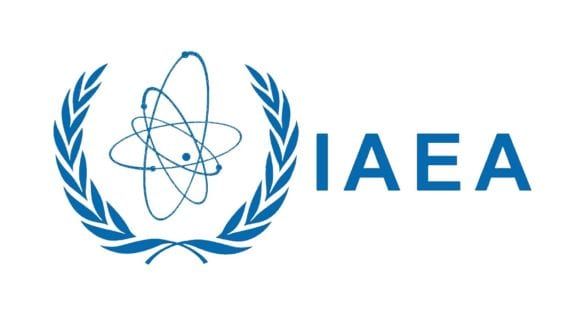Al-Monitor – International Atomic Energy Agency(IAEA)Director General Rafael Mariano Grossi arrived in Iran today following reports that Iran had produced particles of enriched uranium at 83.7%, close to the 90% required for weaponization. The IAEA Board of Governors meets next week in Vienna, and the US and its EU partners are considering another resolution of censure against Iran.
US Iran Envoy Robert Malley told Laura Rozen that the US would wait for Grossi’s report before making a call on next steps. Grossi is expected in Washington the following week.
A senior EU official, speaking not for attribution, told Al-Monitor that there is some hope for Grossi’s visit, although it’s not clear whether it will bring about a renewed cooperation with Iran.
Dermer in Washington
US President Joe Biden has said he won’t let Iran get a nuclear weapon on his watch. Israel has an opportunity for possible military and other options in the absence of a diplomatic track.
Israel Minister of Strategic Affairs Ron Dermer’s upcoming visit to Washington on Monday is all about Iran and therefore well-timed. For Dermer and his boss, Prime Minister Benjamin Netanyahu, the talks on Iran provide a distraction from the escalating tensions over the government’s treatment of Palestinians and the outrage Israel Finance Minister Bezalel Smotrichtriggered after saying that the West Bank Palestinian village of Huwara should be “wiped out.” State Department Spokesperson Ned Price called the remark “repugnant.” US officials are avoiding Smotrich, who is also visiting Washington next week.
The friction over the radical right wing of Israel’s government has made talk of a White House invitation to Netanyahu “science fiction,” writes Ben Caspit.
But Iran is Netanyahu’s legacy issue, the one thing that really matters to him, and here the US and Israel are finding common ground. Israel is ramping up its preparations for an attack on Iran’s infrastructure; Ben Caspit has the scoop here.
Expect Israel to further open up the conversation on military options this week. For both Washington and Jerusalem, Iran appears on a separate track from the discord over Smotrich and the radical right.
Iran’s mixed signals on diplomacy
By continuing to enrich uranium, Iran is in a way declaring its own type of deterrence, reminding world powers that it is a nuclear threshold state.
But its diplomatic signals appear unclear or contradictory, which may reflect a divided leadership on whether to pursue a nuclear deal or double down on an eastern strategy, deepening ties with Russia, China and others.
The challenge, and it’s a tough one, is to find the diplomatic thread on the nuclear front.
Such threads could include an exchange of prisoners and release of as much as $7 billion in foreign assets, along with some type of understanding on IAEA inspections, what is called a “less for less” option.
A senior Iranian official, speaking not for attribution, said that the best diplomatic track would be to resume a P4+1 format, that is Iran and the parties to the Joint Comprehensive Plan of Action (JCPOA), minus the US, which would be out of the room — although this is complicated by Russia’s participation in the Ukraine war.
Iran is also ready to close the “outstanding issues” in the IAEA safeguards file “through technical cooperation and political goodwill,” the official added.
Last week, an Iranian official told Al-Monitor that Iran would adhere to IAEA safeguards inspections as a signatory to the NPT, and is ready to engage in separate talks on Ukraine.
The regional connection
The outcome of the nuclear issue could impact Iran’s approach to regional accounts.
While Washington’s Gulf partners are all-in on more expansive deterrence to Iran, there appears, on the surface, little appetite for a military escalation, unless Iran moves first.
Iran’s behavior has been more nuanced, and the temperature seems lower along some of the usual fault lines, as Iran’s leaders have been preoccupied with domestic unrest and calls for reform.
For example, the Israel-Lebanon maritime demarcation deal last year is actually an Iran deal by proxy, via Hezbollah. A senior Iranian source told Al-Monitor last week that Iran is fine with the deal, because it’s economic, not political, and it serves the Lebanese people.
Both the Israel-Lebanon front and Gaza have been mostly quiet despite the unrest in the West Bank. Gaza, with Hamas and Islamic Jihad, is where Iran has the most sway. Iran’s declaratory policies are mostly aligned with Arab and Islamic countries alarmed by Israeli statements and actions. But Iran has so far not encouraged its allies to escalate.
Iran may be on the losing end of efforts to reintegrate Syria into the Arab League, which got a big push following the earthquake last month. Syrian President Bashar Al-Assad has received a flurry of Arab officials and visitors, and now has some cards to play in regional politics. His embrace of Iran and Russia has helped him hold on to power, but there’s not a lot of sentimentality in these ties. Iran is not losing Syria, but Tehran’s influence there is increasingly contested.
As for Iraq, the relative quiet since Prime Minister Mohammed Shia Al-Sudani took office in October 2022 depends on the continued good will of what Iraqis call “the neighbor,” meaning Iran. Tehran’s allies are the main force in the Coordination Framework, the political coalition behind Sudani. There is no longer any real contest or tension about who controls Iraq’s security services, as the Iran-linked Popular Mobilization Units, or militias, hold political and administrative power. A senior Iranian official told Al-Monitor last week that Tehran has “no concerns about US-Iraq or Iraq-GCC ties,” adding that “Iran won’t bring its disputes to Iraq.”
Ali Hashem contributed to this report.
 Shabtabnews In this dark night, I have lost my way – Arise from a corner, oh you the star of guidance.
Shabtabnews In this dark night, I have lost my way – Arise from a corner, oh you the star of guidance.



